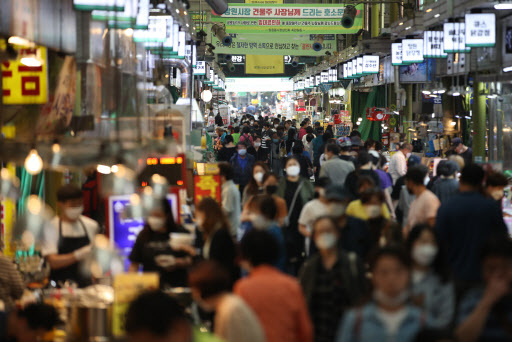Universal basic income emerges as political hot potato in S. Korea
By Ock Hyun-juPublished : June 8, 2020 - 20:22

Universal basic income is emerging as a hot button issue in South Korea’s political arena as the country seeks to curb the economic fallout from the COVID-19 pandemic.
The idea of handing out cash to boost individual income regardless of wealth or employment status has largely been considered radical, with many on both sides of the aisle dismissing it as an unrealistic, populist policy.
But it now appears to be gaining momentum in the political realm amid the COVID-19 crisis as public calls grow for another round of government-led cash payments amid the prolonged pandemic.
All Koreans and foreign nationals married to Koreans received cash relief from the government, ranging from 100,000 won to 400,000 won ($83-$332), as part of efforts to boost consumer spending.
Rep. Lee Nak-yon, who served as the first prime minister of the Moon Jae-in administration and is considered the most favored presidential candidate in the 2022 elections, “welcomed” the debate.
“I understand the purpose of the basic income system,” the five-term lawmaker said Monday on his Facebook. “But I hope there are discussions and reviews on what the concept of the basic income system is, whether it replaces the current welfare system or complements it, how to secure financial resources (for the system) and what sustainable ways are to implement the system.”
The debate on basic income was reignited after Kim Chong-in, head of the conservative opposition United Future Party’s emergency committee for reform, suggested it is time for a fundamental review of the system last week. The basic income system has so far only been endorsed by liberal politicians.
Other top presidential contenders are joining the debate.
Gyeonggi Province Gov. Lee Jae-myung, who is a longtime advocate of the basic income system, reiterated his support for the system. He said it is “unavoidable” policy to overcome a “structural” economic recession in the “fourth industrial revolution,” stemming from profits concentrated on a handful of companies, disappearing jobs and diminishing consumer spending.
“We could begin with a small amount of money without raising taxes or issuing national bonds and gradually increase the amount and eventually raise the taxes to expand the basic income scheme when public consensus is formed,” Lee said Friday on his Facebook, stressing the need for balancing demand and supply by spurring consumer spending.
Lee has led the world’s largest-scale experiment with his unconditional cash distribution policy for young people living in the province. Under the Youth Basic Income program, Gyeonggi Province, which is home to about 12 million people and encompasses 31 cities and countries, provides 1 million won for a period of one year to those aged 24 and living in the province.
Seoul Mayor Park Won-son, on the other hand, argued that helping the most vulnerable and poor is more justifiable than giving out cash to everybody regardless of their wealth, income and employment status. He claimed that expanding the employment insurance to all workers is more effective in realizing social justice and equality.
“Disaster and crisis strike the poor and vulnerable most early and deeply,” he said Sunday on his Facebook, adding more support and help should go to those who economically suffer more.
“What is fairer? Giving 50,000 won to those who lost jobs as well as those working for a conglomerate in a permanent position and earning nearly 10 million won per month? Or giving 1 million won to those who lost jobs and suffer from economic difficulties?” he asked.
Currently, many self-employed, freelance and irregular workers are sidelined from the national employment insurance scheme despite being most vulnerable to layoffs and pay cuts in the wake of the novel coronavirus outbreak.
Some 48.6 percent of respondents had approved of a universal basic income to “guarantee the minimal level of livelihood,” while 42.8 percent opposed it, citing that it could pose a financial burden to the state budget and increase taxes, according to a recent survey by local pollster Realmeter of 1,881 people aged 18 and over.
Those supporting the ruling Democratic Party of Korea and other small liberal parties were more likely to support the idea at 63.4 percent, but those supporting the conservative bloc were more likely to disapprove, at 67 percent. Of those considered ideologically centrist, 48.7 percent of respondents advocated for the idea and 42.3 percent did not, according to the survey released Monday.
Wanju County in North Jeolla Province became the first municipal government to implement a second batch of cash payment program, with plans to provide 100,000 won to all of its residents starting on June 15.
By Ock Hyun-ju (laeticia.ock@heraldcorp.com)
-
Articles by Ock Hyun-ju







![[Graphic News] More Koreans say they plan long-distance trips this year](http://res.heraldm.com/phpwas/restmb_idxmake.php?idx=644&simg=/content/image/2024/04/17/20240417050828_0.gif&u=)
![[KH Explains] Hyundai's full hybrid edge to pay off amid slow transition to pure EVs](http://res.heraldm.com/phpwas/restmb_idxmake.php?idx=644&simg=/content/image/2024/04/18/20240418050645_0.jpg&u=20240419100350)






![[From the Scene] Monks, Buddhists hail return of remains of Buddhas](http://res.heraldm.com/phpwas/restmb_idxmake.php?idx=652&simg=/content/image/2024/04/19/20240419050617_0.jpg&u=20240419175937)

![[KH Explains] Hyundai's full hybrid edge to pay off amid slow transition to pure EVs](http://res.heraldm.com/phpwas/restmb_idxmake.php?idx=652&simg=/content/image/2024/04/18/20240418050645_0.jpg&u=20240419100350)

![[Today’s K-pop] Illit drops debut single remix](http://res.heraldm.com/phpwas/restmb_idxmake.php?idx=642&simg=/content/image/2024/04/19/20240419050612_0.jpg&u=)